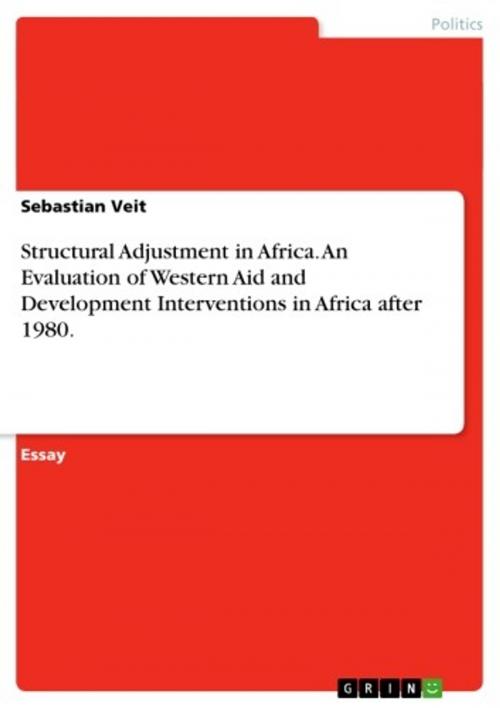Structural Adjustment in Africa. An Evaluation of Western Aid and Development Interventions in Africa after 1980.
Nonfiction, Social & Cultural Studies, Social Science| Author: | Sebastian Veit | ISBN: | 9783638622547 |
| Publisher: | GRIN Verlag | Publication: | March 12, 2007 |
| Imprint: | GRIN Verlag | Language: | English |
| Author: | Sebastian Veit |
| ISBN: | 9783638622547 |
| Publisher: | GRIN Verlag |
| Publication: | March 12, 2007 |
| Imprint: | GRIN Verlag |
| Language: | English |
Essay from the year 2004 in the subject Politics - International Politics - Topic: Development Politics, grade: 1,7, University of KwaZulu-Natal ('African Development'), 7 entries in the bibliography, language: English, abstract: The following paper addresses the widely discussed assertion that the Structural Adjustment Plans (SAP) are the cause for under development in Africa. This is in particular an interesting lesson learned for the development community, as it becomes obvious that mass poverty cannot be tied to one single issue, like household austerity. Moreover, the author stresses the point that poverty alleviation can only be achieved through interdisciplinary approaches that address the complexity of wide spread poverty in Africa. In conclusion, the SAP was an attempt, based on developed country thinking at the time, to fix the issue - the results were not convincing, as purely technocratic solutions hardly will solve the complex problems of Africa. This holds in particular true, when both the socio-economic backgrounds as well as the cultural foundation of people is ignored. In essence, the SAP were falling way short of considering 'the human dimension'. About the Author Sebastian Veit, M.A. Social Science in Globalization, B.A. Hons in Business and Economics. Over the last two years he has been working on projects as a freelance consultant for the UNFCCC, GTZ and the World Bank. Despite the loss of his vision in an acceident in late 1990, he has studied on four continents. Thus, he has gained an understanding of the importance to include 'the local perspective' of people in the combat of mass poverty. By utilizing his inter disciplinary experience, he stresses the need to take peoples socio-economic as well as cultural backgrounds into consideration for a successful solution. His goal is to further deepen his expertise in development strategy and energy services, that contribute in a sustainable manner to poverty alleviation.
Essay from the year 2004 in the subject Politics - International Politics - Topic: Development Politics, grade: 1,7, University of KwaZulu-Natal ('African Development'), 7 entries in the bibliography, language: English, abstract: The following paper addresses the widely discussed assertion that the Structural Adjustment Plans (SAP) are the cause for under development in Africa. This is in particular an interesting lesson learned for the development community, as it becomes obvious that mass poverty cannot be tied to one single issue, like household austerity. Moreover, the author stresses the point that poverty alleviation can only be achieved through interdisciplinary approaches that address the complexity of wide spread poverty in Africa. In conclusion, the SAP was an attempt, based on developed country thinking at the time, to fix the issue - the results were not convincing, as purely technocratic solutions hardly will solve the complex problems of Africa. This holds in particular true, when both the socio-economic backgrounds as well as the cultural foundation of people is ignored. In essence, the SAP were falling way short of considering 'the human dimension'. About the Author Sebastian Veit, M.A. Social Science in Globalization, B.A. Hons in Business and Economics. Over the last two years he has been working on projects as a freelance consultant for the UNFCCC, GTZ and the World Bank. Despite the loss of his vision in an acceident in late 1990, he has studied on four continents. Thus, he has gained an understanding of the importance to include 'the local perspective' of people in the combat of mass poverty. By utilizing his inter disciplinary experience, he stresses the need to take peoples socio-economic as well as cultural backgrounds into consideration for a successful solution. His goal is to further deepen his expertise in development strategy and energy services, that contribute in a sustainable manner to poverty alleviation.















